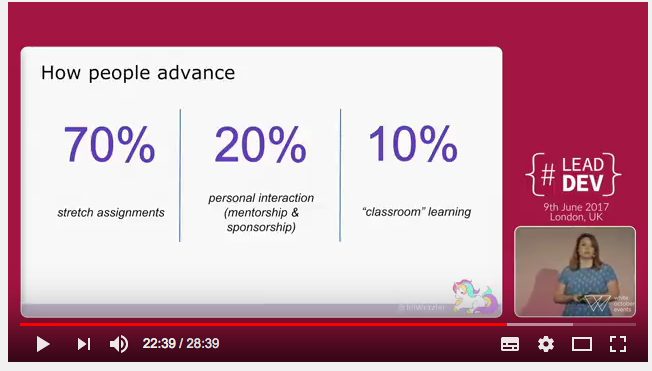Continuing on my theme from the previous post, the second talk I listened to was by Jill Wetzler, Director of Engineering at Lyft. She gave at talk at the LeadDev conference on Tips for Developing Diverse teams.
How do we earn trust as a leader? The answer is safety, feedback and advocacy.
- Safety
- We need to feel safe at work so we are able to do our best work.
- If we don’t feel safe, especially for underrepresented people in tech, we will leave the company or leave tech
- As a leader, be authentic and offer personal stories about your life outside of work. Jill mentions how she has a shrine to Beyoncé on her desk, as well as pictures of her dog.
- Being authentic means that it’s easier to talk when things get hard
- Cultural awareness is part of your job. Read up on cultural issues that might impact your employees on your own time, don’t expect them to educate you.
- Diversity your networks, whether it be hanging out with people who don’t work in tech, or diversifying who you follow on twitter.
- She mentioned how difficult can be for people to deal with the news and how it will impact them at work i.e. police murder of unarmed civilians and worrying about their family members in their communities. Referenced Lara Hogan’s Managing in Terrible Times (Support in 1x1s section) about how to ask employees if they need support.
- What happens when safety is violated? Apologize and say you’re sorry. Do the reading so it doesn’t understand again. Allows the person who suffered harm to determine response. Prioritize the safety of the person harmed, believe them.
- Feedback
- Women are 20% less likely to be given constructive feedback. Why? Fear of human emotions. Jill mentions that she has had men and women cry when she has given feedback. If people cry, ask if they are okay. Do they need a minute? Giving feedback when it sucks is your job as a manager. It’s a disservice, especially to underrepresented people in tech to not give feedback.

- This chart describes how to give structured feedback. Before she gives feedback, she checks her biases, would she give the same feedback to person who looked different but had the same performance?
- Women are 20% less likely to be given constructive feedback. Why? Fear of human emotions. Jill mentions that she has had men and women cry when she has given feedback. If people cry, ask if they are okay. Do they need a minute? Giving feedback when it sucks is your job as a manager. It’s a disservice, especially to underrepresented people in tech to not give feedback.
- Sponsorship
- How people advance. 70/20/10% rule

- This slide was really an “a-ha” moment for me. No matter how much you study or learn on your own, the most important things to advance to more meaningful work are stretch assignments and sponsorship. It you don’t have someone advocating for you to do more challenging work, you won’t have that opportunity no matter how much work you do on your own.
- You need sponsors to level you up. As a junior team member, you can level up interns, as a senior engineer your role is to level up juniors, and as a manager your job is to level everyone up.
- Sponsorship is advocating for people to have high profile assignments
- Men are 45% more likely to be sponsored because of pattern matching, people pick people who look like them.
- How Jill provides sponsorship
- Volunteer under-indexed people for new roles or projects
- Proactively share their interests with influential people at her level or above
- Publicly endorse protégés for the work they are good at
- Hold senior team members accountable for sponsoring others
- Sponsor people are who aren’t like you
- How people advance. 70/20/10% rule
I counted the number of managers I’ve had in my tech career, at five different companies. The answer is 20. This number is a bit skewed by the first company I worked at which considered reorgs an Olympic sport. Some managers have been good, some have been great, some have … needed leadership development.
My observation is that the best managers are genuinely interested in your work and growth. They actively seek projects for that will help you reach your career goals. They provide you with constructive and actionable feedback so you can become better. I’ve had managers at previous employers that only checked in with me at performance review time with a “Great job Kim, keep it up.” When I would ask what I could do better, or if there were opportunities for a new role they wouldn’t have an answer.
In some cases, a manager may not be able to offer you new opportunities because the company may not be growing, or the scope of the team may being reduced to to budget constraints or a shift in product focus. Ultimately, if a person is seeking work with more impact and that opportunity isn’t there, it’s time to move to a new group or a new company.
Further Reading
Harvard Business Review: Study: Women Get Fewer Game-Changing Leadership Roles

0 comments on “Management: Developing Diverse Teams”